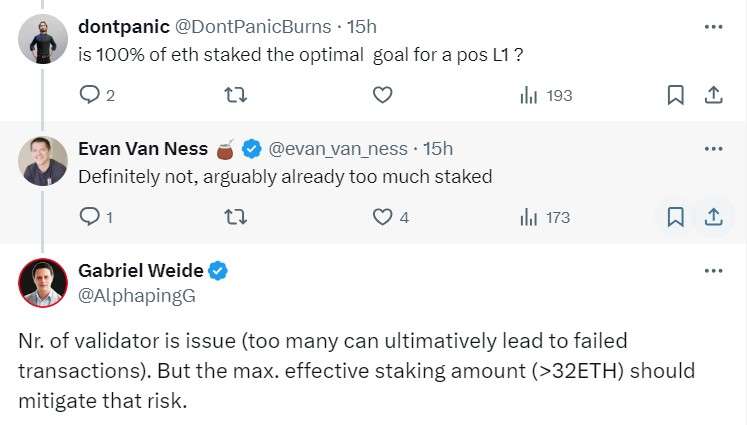Ethereum network recently achieved a milestone of one million validators, staking 32 million Ether valued at around $114 billion.
The Ethereum network recently reached the milestone of one million validators, with 32 million Ether being staked, valued at around $114 billion, depending on the current market pricing.
Ethereum Hits One Million Validators Milestone
On March 28, the Dune Analytics dashboard that Hildobby developed to monitor the progress of Ethereum staking revealed that the network had reached a validator count of one million.
The 32 million staked ETH accounted for 26% of the total supply of the coin. In addition, the data demonstrated that approximately 30% of Ethereum is staked through the staking pool Lido. This platform facilitates liquid staking for proof-of-stake (PoS) coins.

A significant reason for the continued popularity of staking pools like Lido is that they enable users with a smaller quantity of ETH to pool their assets and participate.
By monitoring the network for harmful transactions, such as double-spending, which is effectively spending the same currencies twice, validators protect the security of a blockchain. Validators accomplish this by monitoring the network for any malicious transactions.
Validators participate in proposing and validating transactions from within the network. Those who are interested in taking part in this procedure are required to stake 32 euros in Ethereum. In exchange for their services, they receive a small amount of ETH.
Although the number of validators could potentially result in increased security for a blockchain, there are members of the community who believe that an excessive number of validators could be problematic.

Venture capitalist and Ethereum promoter Evan Van Ness expressed concern about the potential for “too much” staked. One of the people who maintains a staking pool, Gabriel Weide, believes that having an excessive number of validators can eventually result in “failed transactions.”
The chief of engineering at Coinbase Wallet, Peter Kim, claimed that while the number of validators is “impressive,” the 32 ETH cap “artificially inflated” it. Kim made this statement when the cryptocurrency was still in circulation. But he hinted that this might change shortly.
One of Ethereum’s co-founders, Vitalik Buterin, proposed a method to improve the network’s decentralization due to the continuous rise in validator usage.
However, on March 27, Buterin proposed penalizing validators based on the average failure rate of their operations in a blog post. The penalty for each failure will increase when many validators fail to pass a particular slot.
According to Buterin, such a strategy can lessen the advantage that stakers with significant amounts of Ethereum have over those with smaller amounts.












